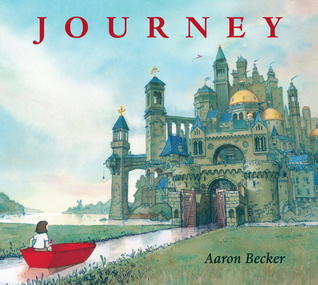The Library Adventure uses affiliate links, see our policies for more information.
I’ve long been an avid fan of picture books, but, honestly, it took me a while to become excited about wordless picture books.
But, now that I see their numerous benefits (and how amazing they can be), I’m a dedicated fan of several phenomenal wordless masterpieces.
My son with special needs loves to read. He really focuses on the words, too. (He catches if I ever accidentally skip words when reading a chapter book aloud!) But, he also enjoys illustrations. With his severe expressive speech delay (among other special needs), it’s sometimes challenging to check comprehension. We’ve also had to intentionally focus on encouraging creative opportunities.
Wordless picture books help with developing comprehension and boosting creativity through using context clues in the illustrations. Sometimes wordless picture books bring more attention to themes, setting, and more, enhancing learning of those storytelling aspects.

With kids with special needs, we might need to modify our wordless picture book “reading” just a bit. Hopefully these tips below can help!
Reading Wordless Picture Books with Kids with Special Needs
- Play a simple game of “I see…” You can begin the game by coming up with your own sentences and allow your child to find those objects. (Example: “I see a bird. Do you see a bird?”) If your child is easily able to easily find the same objects, have your child finish the “I see…” sentence. What your child mentions might spur on more questions and storytelling ideas.
- Hone observation skills by asking seek-and-find questions. (Example: “I see someone jumping. Point to who is jumping.”) I used this strategy often before my son was able to sign much or make a few audible sounds. You can also practice categorizing as your child needs it. You can ask for your child to point to all the farm animals on the page, anything blue, all the round objects, etc.
- Focus on emotions. With my son’s particular needs, he doesn’t always understand more complicated concepts (like time), but he is extremely in tune to emotions. Many kids can relate to feeling happy, sad, frustrated, and scared. Have your child decide how the characters on the page are feeling and express that to you.
- Ask what’s happening… but with scaffolding clues, if needed. Instead of just “what’s happening now?” you can ask, “What is the boy doing with the robot?” Questions like these can help pinpoint a particular part of the story without prodding your child’s response too much. Some children with special needs might not be able to express what’s happening over a whole page, but can tell you what one character is doing.
- Practice anticipating future actions. Sometimes children with certain special needs have difficulty anticipating someone else’s future actions or emotions. Asking “what will the character do next?” might be too unrelatable to answer. Help your child still develop this anticipatory skill by asking, “What would you do next if you were in this situation?” A personal perspective can encourage creative thinking while in a frame of mind your child can understand.
A few great wordless picture books
This is only a short list out of many amazing wordless picture books, but these are a few my kids and I love!

Journey by Aaron Becker (Candlewick, 2013) – Oh, this book. This book is what made me a firm believer in wordless picture books. What seems like a dull world can be made wonderfully alive through imagination, which takes the form of red and purple crayons and a couple of ingenious kids.

Quest by Aaron Becker (Candlewick, 2014) – This follow up to Journey is quite possibly even more beautifully illustrated than its predecessor. The main characters go on a mysterious quest, and the action and events that follow allow for amazing storytelling opportunities.

Flashlight by Lizi Boyd (Chronicle, 2014) – This wordless wonder has so much going on in the background. A young boy explores the outdoors with his flashlight at night and makes some amazing findings! We love the friendship twist, and this book allows even young pre-readers to create stories to accompany the wide variety of animals.

Wave by Suzy Lee (Chronicle, 2008) – This ocean-based book is beautiful and full of emotion as a young child explores the sand and the waves. The watercolor illustrations are absolutely gorgeous while still remaining simple.

South by Patrick McDonnell (Little, Brown, 2008) – I’m a big Patrick McDonnell fan (creator of the comic strip, Mutts), and this wordless picture book carries the sweet heart of his Mutts characters into this book. Kids will love the journey a little bird and Mooch take together.
More resources
- For other tips, read this great post from What Do We Do All Day on reading wordless picture books.
- Also check out this book list from I Can Teach My Child.
- And here are thoughts from wordless picture books authors on reading wordless books.
- Aaron Becker (author of Journey and Quest) wrote a guide for parents/teachers reading wordless books with their children here. It’s great and goes into helpful detail! (Thanks to Aaron for stopping by and mentioning that in the comments!)
What are your kids’ favorite wordless picture books? How do you help your children – no matter what their needs – explore these books?

Caroline- thanks for the kind write up. You can also Google a guide I wrote for reading wordless books with students. Though it seems you’ve got it down! Aaron
Aaron – first, thank you so much for coming by to read the post and comment! Second, I just found the guide you wrote, and it’s great! I’ll add it to the resources list here! Thanks so much. And thanks even more for your amazing books.
Great tips! I have special needs kids too(Autism) and I will look into checking out some of these books from the library.